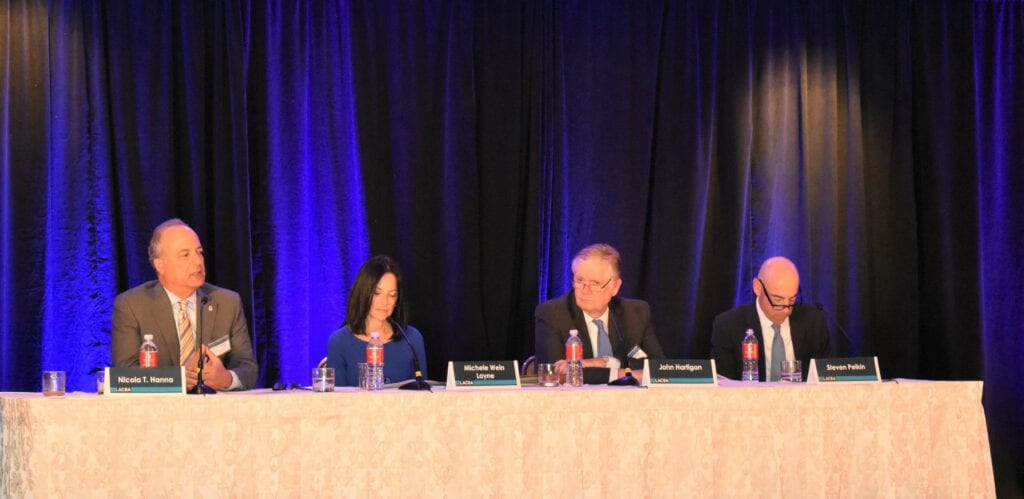Search Posts
Recent Posts
- Do you meet the definition of an “Accredited Investor” under the new SEC Rules? December 8, 2020
- Do You Really Have Time To Read & Understand The Heroes Act? November 23, 2020
- Governor Newsom – Please Order all Court Buildings in the State of California Closed starting March 16 March 15, 2020
- Three Men Arrested in $722 Million Cryptocurrency Fraud Scheme Targeting “Dumb” Investors December 10, 2019
- Should Court Transcripts be Provided to Parties Free of Charge? December 3, 2019
Categories
Subscribe!
Thanks for subscribing! Please check your email for further instructions.

Part 3: Highlights from LACBA’s 52nd Annual Securities Regulation Seminar – Enforcement Developments
Panel: Enforcement Developments
This Enforcement Developments Panel focused on a review of U.S. Securities and Exchange Commission (SEC) and U.S. Department of Justice (DOJ) national and regional enforcement trends and priorities. John F. Hartigan, Partner, Morgan Lewis & Bockius, LLP served as the moderator. The panelists were Nicola T. Hanna, U.S. Attorney for the Central District of California, Steven Peikin, Co-Director, SEC Division of Enforcement and Michele Wein Layne, Regional Director, SEC Los Angeles Regional Office. The bold headlines below are the main takeaways followed by a brief discussion.

The success of the SEC Division of Enforcement should not be based on the number of cases and the dollar amount of disgorgement, particularly in light of the 2019 U.S. Federal Government shutdown
Steven Peikin described the tremendous impact that the U.S. Federal Government shutdown (shutdown) had on the SEC’s ability to carry out its mission. The SEC was closed for 35 days and 94% of the SEC staff were legally prohibited from working. The shutdown caused further delays in obtaining testimony due to people participating in events like Valentine’s Day or Spring Break. Individuals should keep this in mind when reading the soon-to-be published 2019 Annual Report; if you have not read the 2018 Annual Report, you can find it here.
Despite this, the SEC Division of Enforcement is proud of its work on many topics but particularly on the Share Class Selection Disclosure Initiative, a program designed to quickly and effectively bring relief to investors who may have been harmed by investment advisors who have failed to make appropriate disclosures.
Issuers Should Pay Attention to Breakdowns in Internal Controls and Potential Individual Liability Issues
A continuing enforcement trend, such as in cases like Facebook or Volkswagen, can be observed in situations where there is a breakdown in disclosures, internal controls or procedures. The SEC has observed multiple situations where there is a breakdown in internal controls resulting in individuals making public statements that the company is not aware of.
Nicola T. Hanna explained that assistant attorneys are required to assess corporations and identify the reasons why they may be unable to go after individuals, if that is the case.
Michele Wein Layne explained that in investigations coming out of the LA office, fact finding and evidence gathering occurs at the individual level. It takes a long time before the determination can be made to establish individual criminal intent in order to bring a case, however, the LA office always takes into consideration the fairness of bringing a case against an individual.
The SEC should be proud of enforcement actions brought against ICOs
In 2016, about $100 million was raised through Initial Coin Offerings, or ICOs. In 2018, about $15 billion was raised through ICOs. The blockchain community has been vocally critical of the SEC approach. However, the SEC approach is, if a company is raising money from U.S. investors and what that company is selling meets the definition of securities, then certain information must be provided to investors unless an exemption applies. It is problematic to think that billions of dollars can be raised by a company without disclosing information about management, what types of rights security holders have, what the product is, etc.
The following are a few more SEC highlights:
- The SEC is not just addressing issuers but other participants like platforms and celebrity advertisers.
- The SEC has settled registration cases with several companies which provides a pathway to compliance with the federal securities laws.
- The SEC provides an opportunity for investors to seek rescission just like in the case of a Section 12 violation.
- The Division of Corporation Finance has worked hard on an outline for registration of tokens under the Exchange Act.
Issuers should keep an eye on two cases, Kik an Telegram, which are winding their way through courts. In any event, issuers that self-report will be treated favorably. Therefore, it is always better to self-report.
Technology like Artificial Intelligence and other sophisticated tools are being leveraged to find perpetrators
Artificial Intelligence is being used in the enforcement space to uncover market manipulation. Enforcement agencies have developed proprietary tools to make connections between traders and identify patterns of success.
Nicola T. Hanna highlighted the importance of international cooperation in cases of microcap pump and dump schemes. These are cases where a company is promoted, then insiders sell shares, however, most of the insiders are overseas which makes it more difficult to apprehend these individuals. It is cases like these that require the use of sophisticated technological tools to find perpetrators.
Agencies are cooperating more often and parallel cases brought by multiple agencies or governments require an immense amount of collaboration
Michele Wein Layne described a case brought by the SEC against Carole Pederson who was operating a ponzi scheme by preying on her tax clients. In a separate action, the U.S. Attorney’s Office for the Central District of California brought criminal charges arising from the same conduct.
Nicola T. Hanna described his goal is to increase white collar case load, cooperate and collaborate more with both the SEC and security fraud coordinators.
The DOJ, SEC and security fraud coordinators meet on a quarterly basis to stay on top of cases in the pipeline and to collaborate efforts. Steven Peikin described an event recently hosted by the SEC to coordinate efforts among Law Enforcement, DOJ and the SEC. This event was attended by 16 sitting U.S. attorneys which shows there is great interest to collaborate.
U.S. Attorney’s Office says white collar crime is an enforcement priority
Nicola T. Hanna’s office oversees the largest U.S. Attorney’s Office outside of Washington DC. His office is doing well in terms of resources and the DOJ has been fully funded. The quantity of cases brought is not determinative, rather, it is the quality and impact of the cases brought.
Monitorships are used in certain cases
Monitorships are used when there is a need for prospective remediation or the agency lacks confident in an issuer or believes there should be a check and balance on the remediation program.
Please email me with questions or leave a comment below!